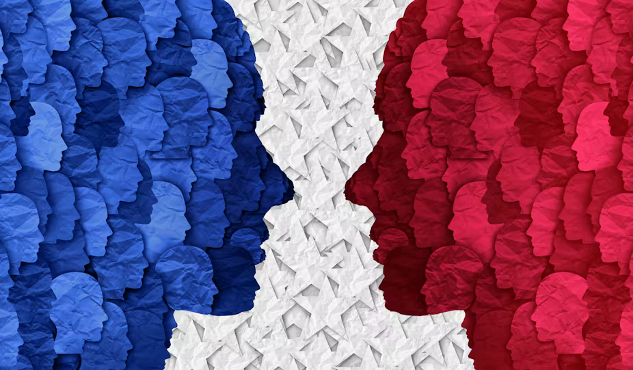
In This Article
- What is politically conditioned variation?
- How subtle language cues reveal political bias
- Why even synonyms can split along party lines
- How speech patterns differ between Democrats and Republicans
- Can AI detect political identity better than humans?
How Political Speech Reveals Hidden Party Bias
by Robert Jennings, InnerSelf.comWe live in a world where you can practically start a fight by saying “climate change” or “tax cut.” But the rabbit hole goes deeper. Thanks to recent research on what’s called politically conditioned variation, it turns out that even innocuous words like “financial” and “monetary” are waving red or blue flags. That’s right. Your vocabulary might be outing you before you even get to the point.
This isn’t some paranoid conspiracy theory. It's statistical science. Researchers combed through over 13 million words spoken by U.S. Congressional representatives between 2012 and 2017. They analyzed the frequency of each word used by Democrats and Republicans, applied log-odds formulas, and discovered patterns that most of us wouldn’t consciously pick up on—but our brains still react to them.
Dog Whistles, Meet Dictionary
You've probably heard of “dog whistle politics”—coded language meant to signal alignment to a base without triggering the opposition. But this is a step beyond that. This isn’t about intention. It’s about unconscious habits. Even when Democrats and Republicans are talking about the same topic, they tend to use different words. One says “immigrants,” the other says “aliens.” One says “support,” the other says “oppose.” It’s not just tone—it’s lexicon warfare.
Take the pair “financial” versus “monetary.” Both refer to money. They’re practically synonyms. But according to the study, Democrats prefer “financial,” while Republicans lean into “monetary.” Why? It’s not because one side owns a thesaurus and the other doesn’t. It’s because language is shaped by group identity—and in politics, identity is everything. Even down to the syllables.
The Mind Reads Between the Words
Ordinary people—without being trained linguists or political strategists—can pick up on these subtle cues. In study after study, participants were able to guess whether a word was more likely to be used by a Democrat or Republican at rates better than chance. And they didn’t need context. Just the word. No speeches, no faces, no policy positions—just plain text.
Now, if you're thinking, “So what? This just proves people make assumptions,” you’re only half right. Yes, we do. But the real kicker is that our assumptions are often statistically accurate. That means these linguistic patterns are strong enough to influence perception—and perception influences trust, cooperation, and even voting behavior.
Why It Matters in a Polarized World
In a society tearing itself apart over which side you’re on, being able to detect someone’s political identity based on word choice is a superpower—or a curse. Social media already rewards us for sticking to our bubbles. If our brains start using words as tribal signals, we're not just divided by opinion anymore. We’re speaking different dialects of democracy. And that’s dangerous.
Language has always been political. From the Enlightenment’s embrace of “reason” to Orwell’s “Newspeak,” the words we use reflect the world we want—or the world we fear. In America today, the very building blocks of speech are splitting along party lines. That’s not just a sign of polarization; it’s a symptom of cultural fragmentation. And once communication breaks down, cooperation isn’t far behind.
Enter the Algorithms
Of course, this is the age of AI. So naturally, the researchers didn’t just stop at asking people to guess word meanings. They trained algorithms to detect these patterns, too. And surprise—the machines were even better at it. Using techniques like support vector machines and generative models, they could accurately determine party affiliation based solely on linguistic markers.
It raises the question: if AI can detect our political identity from our words, what else can it infer? Are we handing over our biases on a silver platter every time we post, tweet, or talk? The implications for surveillance, targeted advertising, and political manipulation are staggering—and we haven’t even scratched the surface.
The Paradox of Political Speech
Ironically, the more we try to hide our partisanship with polite euphemisms, the more we may be revealing it. There’s no neutral way to say “healthcare” or “welfare” anymore. The words themselves carry cultural baggage. They’ve been conditioned. And unless we all start speaking in code like spies, our political leanings will continue leaking through our lips.
But maybe that’s not a flaw—it’s a feature. After all, language is how humans express identity. We can’t strip politics out of speech any more than we can remove rhythm from music. The challenge is to recognize when that rhythm becomes a drumbeat for division, and to resist the urge to march blindly in step.
The Bigger Picture
So what can we take from all this? First, that language is a mirror—one that reflects our affiliations more than we realize. Every time we open our mouths, we’re sending up little partisan flares, signaling to friend and foe alike where we stand, even when we think we’re just being “neutral.” Second, that politically conditioned variation isn’t some academic fantasy cooked up in a think tank. It’s real. It’s measurable. And it’s already shaping how we perceive others, how we interact, and how we trust—or dismiss—what someone says based on nothing more than a single word choice.
And third, perhaps most importantly, that awareness is our only defense. Not regulation. Not censorship. Awareness. The moment we realize our own language has been shaped by political identity—just as surely as our taste in news or our opinions about taxes—we gain a tiny bit of agency. That awareness doesn’t mean we abandon our values, but it does mean we might pause before assuming someone who uses a different word must be our enemy. It means we can resist the pull of language that’s been weaponized—not by intent, but by conditioning.
Because make no mistake, this isn’t about vocabulary. It’s about democracy. If language continues to fragment along party lines, we won’t just disagree—we’ll become mutually unintelligible. That’s how civilizations break down. Not with bombs or ballots, but with Babel. When words lose shared meaning, truth becomes relative, communication becomes impossible, and all that’s left is noise.
And that’s the part we really ought to be afraid of—not that politicians use different words, but that we’ve become so conditioned by those differences that we stop hearing each other altogether. So maybe it’s time we listen a little harder. Not just to what’s being said, but how it’s being said. And maybe, just maybe, we’ll find that the gap isn’t quite as wide as it seems—at least not yet.
Because if we can’t even agree on the words, how can we ever agree on the truth?
About the Author
 Robert Jennings is the co-publisher of InnerSelf.com, a platform dedicated to empowering individuals and fostering a more connected, equitable world. A veteran of the U.S. Marine Corps and the U.S. Army, Robert draws on his diverse life experiences, from working in real estate and construction to building InnerSelf with his wife, Marie T. Russell, to bring a practical, grounded perspective to life’s challenges. Founded in 1996, InnerSelf.com shares insights to help people make informed, meaningful choices for themselves and the planet. More than 30 years later, InnerSelf continues to inspire clarity and empowerment.
Robert Jennings is the co-publisher of InnerSelf.com, a platform dedicated to empowering individuals and fostering a more connected, equitable world. A veteran of the U.S. Marine Corps and the U.S. Army, Robert draws on his diverse life experiences, from working in real estate and construction to building InnerSelf with his wife, Marie T. Russell, to bring a practical, grounded perspective to life’s challenges. Founded in 1996, InnerSelf.com shares insights to help people make informed, meaningful choices for themselves and the planet. More than 30 years later, InnerSelf continues to inspire clarity and empowerment.
Creative Commons 4.0
This article is licensed under a Creative Commons Attribution-Share Alike 4.0 License. Attribute the author Robert Jennings, InnerSelf.com. Link back to the article This article originally appeared on InnerSelf.com
Article Recap
Political speech isn’t just about content—it’s shaped by subtle language variation that reveals party affiliation. Known as politically conditioned variation, this linguistic divide is detectable even in seemingly neutral word choices. From congressional speeches to everyday talk, word patterns reflect deeper ideological divides. Understanding this can help us recognize bias, challenge assumptions, and perhaps start bridging the political language gap.
#PoliticalSpeech #LanguageVariation #WordChoice #DemocratsVsRepublicans #PoliticalIdentity



